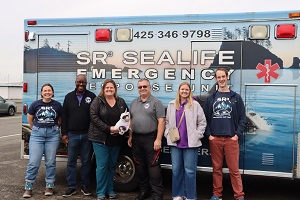Learning with SeaLife Response, Rehabilitation, and Research
Release Date:
As a west-coast state, educators can incorporate a lot of hands-on learning into lessons about the sea. Many Washington students may not know that these lessons in school can translate to meaningful careers—careers like the ones at SeaLife Response, Rehabilitation, and Research (SR3) located in Des Moines.
 The non-profit invited State Board of Education representatives to visit and learn more about how educators can connect with this nonprofit and how the organization relies on interns and volunteers to rehabilitate our state’s sea life. Board member, Harium Martin-Morris, Executive Director, Randy Spaulding, and communicators, Stephanie Davidsmeyer and Indiana Hilmes visited along with Snorkels, the State Board’s mascot. Check out Indy's From Student to Professional segment with Casey Mclean (Executive Director of SR3 and licensed vet).
The non-profit invited State Board of Education representatives to visit and learn more about how educators can connect with this nonprofit and how the organization relies on interns and volunteers to rehabilitate our state’s sea life. Board member, Harium Martin-Morris, Executive Director, Randy Spaulding, and communicators, Stephanie Davidsmeyer and Indiana Hilmes visited along with Snorkels, the State Board’s mascot. Check out Indy's From Student to Professional segment with Casey Mclean (Executive Director of SR3 and licensed vet).
For over a year, we have used a stuffed harbor seal as a “flat Stanley” of sorts (we bring him places and take photos and tell stories about the trip). We bring the stuffed seal to classrooms and educational environments and share back about the experience. After making a connection with SR3 on Instagram and at a local event, we knew we had to see the place for ourselves.
SR3 is a small organization that responds to marine animals in need in many ways. Whales get entangled in lost fishing gear, seals get stranded, and even sea turtles need emergency response in our waters. With the help of supportive partners, SR3 has saved the lives of over 50 harbor seal pups and cares for dozens of other animals. They have an ambulance (photographed above), a full medical suite with x-ray and anesthesia, a fish kitchen, and a team of dependable interns and volunteers who help run the whole show.
During our visit, we learned invaluable lessons. Most importantly what to do if you encounter a marine animal in the wild, like an adorable baby seal. As painful as it is to refrain from the cuteness, do not touch and stay far away! Giving these animals space is important because just being close can scare pups and mothers apart (see numbers below for help).
We also learned that the more experiences you have, the more likely you are to find a career you care about. Executive Director, Casey Mclean, Communications Specialist, Kate Hruby, and Community Engagement Coordinator, Patrick Hutchins shared advice on how they got to where they are today. The whole team has found creative ways to engage communities, like on social media or in classrooms across the state via Zoom. One example Patrick gave was a partnership with MaST Center Aquarium called “SeaLife CSI” where students are sent a skeleton of an animal and must work together to identify characteristics. SR3 welcomes classrooms from all over the state for virtual tours—engaging students in science and piquing the interest of future biologists, veterinarians, and/or sea life rehabilitators.
Don’t miss the Q&A segment, featuring an educational dance, a deeper look at the x-ray machine, and more on SBE’s Instagram page and YouTube channel.
Special thanks to SR3 for letting us take a glimpse inside your world, and for your work keeping animals safe and in their natural habitat!
Resources for marine mammal encounters:
Do not touch! Marine mammals including seals, sea lions, sea otters, whales, and porpoises are protected by the federal laws that require the public to stay 100 yards away. Find more information about animal behaviors on SR3’s website.
If you believe a marine animal is in distress or injured, contact the West Coast Marine Mammal Stranding Network at 1-866-767-6114.
If you find an entangled whale along Washington, Oregon, or California call the NOAA Fisheries Entanglement Reporting Hotline at 1-877-SOS-WHALe (1-877-767-9425). Prompt reporting is the best way to assist an entangled animal.
If you see a sea otter on the beach in Washington, please contact the Washington Sea Otter Stranding Hotline at 1.87.SEAOTTER (1-877-326-8837).
Media Contact:
Stephanie Davidsmeyer
Director of Communications
stephanie.davidsmeyer@k12.wa.us





